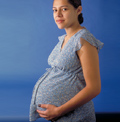 A new Dutch study confirming that the flu vaccine is safe for pregnant women has been welcomed by midwives.
A new Dutch study confirming that the flu vaccine is safe for pregnant women has been welcomed by midwives.
Pregnant women are one of the high-priority groups for the annual flu vaccine which protects them and their baby. Previous research has shown that the vaccine is safe and reduces the risk of babies being born prematurely or with low birth-weights.
Now new research, published at the European Society for Paediatric Infectious Diseases (ESPID) conference in Dublin, shows that H1N1 vaccination of pregnant women during the influenza pandemic did not adversely affect growth or development of children in the first year of life.
“This is good news as it confirms the results of previous studies on the safety of the flu vaccine for pregnant women and their unborn baby,” said Louise Silverton, director for midwifery at the Royal College of Midwives in the UK.
The flu vaccine is recommended for pregnant women by the World Health Organisation, the European Centre for Disease Prevention & Control (ECDC) and health authorities across Europe. The vaccine is free for pregnant women in many countries.
Professional associations of doctors, nurses and midwives also recommend flu vaccination during pregnancy.
“We continue to recommend that pregnant women have the flu vaccination during the flu season – autumn and winter – to protect themselves and their baby from the effects of flu,” Ms Silverton said.
“We also urge midwives and other health professionals to have the vaccination to protect themselves, their family and the people they care for from the infection.”
<iframe width=”560″ height=”315″ src=”//www.youtube.com/embed/nm1Ia7fHlJo” frameborder=”0″ allowfullscreen></iframe>
Pregnancy: the flu vaccine priority
Research findings
The new Dutch research was led by Dr Nicoline van der Maas, of the National Institute for Public Health and the Environment in the Netherlands. She looked at a total of 1,739 pregnant Dutch women (68% vaccinated, 32% not vaccinated) took part in the swine flu (H1N1) vaccination safety study.
Dr van der Maas and her team tracked the growth and development of the infants in their first year of life, as well as monitoring infection-related contacts with their general practitioners.
Weight-for-age, length-for-age, head circumference-for-age, motor function, speech, language and psychosocial parameters were assessed. The study found no difference between infants of vaccinated and unvaccinated mothers.
“These findings are reassuring for public and professionals and may help the decision-making process on maternal immunisation in case of a new pandemic and possible other infectious diseases, which can be prevented by this strategy,” said Dr van der Maas.



